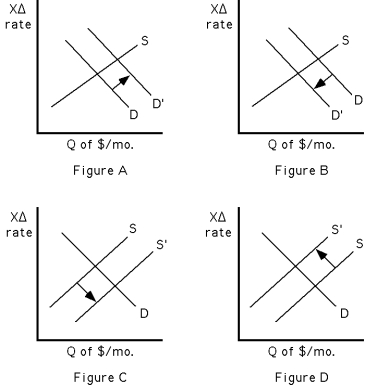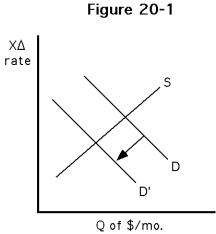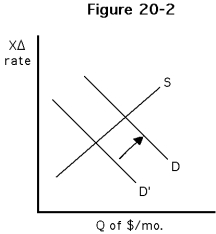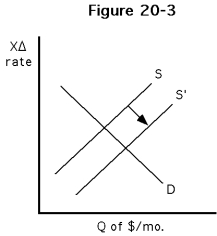Deck 4: Monetary Policy , and How Exchange Rates Are Determined
Question
Question
Question
Question
Question
Question
Question
Question
Question
Question
Question

Unlock Deck
Sign up to unlock the cards in this deck!
Unlock Deck
Unlock Deck
1/11
Play
Full screen (f)
Deck 4: Monetary Policy , and How Exchange Rates Are Determined
1
Which of the following is not a tool of monetary policy controlled by the Fed?
A) open market operations
B) setting the required reserve ratio
C) the power to tax
D) setting the discount rate
A) open market operations
B) setting the required reserve ratio
C) the power to tax
D) setting the discount rate
the power to tax
2
A price index that measure the average change in the prices of all domestic personal consumption expenditures where the weights of items in the index changes is?
A) The core consumer price index
B) The personal consumption expenditures price index (PCEPI)
C) The consumer price index
D) The whole sale price index
A) The core consumer price index
B) The personal consumption expenditures price index (PCEPI)
C) The consumer price index
D) The whole sale price index
The personal consumption expenditures price index (PCEPI)
3

-Refer to Figures A, B, C, and and D. Which of the figures best illustrates a situation where U.S. income rises, ceteris paribus?
A) Figure A
B) Figure B
C) Figure C
D) Figure D
Figure C
4

-Refer to Figures A, B, C, and D. Which of the figures best illustrates a situation where foreign income rises ceteris paribus?
A) Figure A
B) Figure B
C) Figure C
D) Figure D

Unlock Deck
Unlock for access to all 11 flashcards in this deck.
Unlock Deck
k this deck
5

-Refer to Figures A, B, C, and D. Which of the figures best illustrates a situation where foreign interest rates rise relative to U.S. rates ceteris paribus?
A) Figure A and D
B) Figure B and C
C) Figure C
D) Figure D

Unlock Deck
Unlock for access to all 11 flashcards in this deck.
Unlock Deck
k this deck
6

-Refer to Figures A, B, C, and D. Which of the figures best illustrates a situation where the dollar price of U.S. goods increases relative to the dollar price of foreign goods ceteris paribus?
A) Figures A and D
B) Figures B and C
C) Figure C
D) Figure D

Unlock Deck
Unlock for access to all 11 flashcards in this deck.
Unlock Deck
k this deck
7

-Refer to Figures A, B, C, and D. During the first half of the 1980s, the U.S. Government engaged in expansionary fiscal policy and tight monetary policy. One result was a significant increase in U.S. interest rates relative to the rest of the world. Which of the figures best illustrates this historical experience?
A) Figures A and D
B) Figures B and C
C) Figure C
D) Figure D

Unlock Deck
Unlock for access to all 11 flashcards in this deck.
Unlock Deck
k this deck
8
If the price of a new Rolex watch is 18,000 francs in Switzerland, ignoring all other costs, what will the U.S. dollar price be if one Swiss franc buys $0.78 dollars?
A) $23,076.92
B) $21,867.51
C) $13,978.53
D) $14,040.00
A) $23,076.92
B) $21,867.51
C) $13,978.53
D) $14,040.00

Unlock Deck
Unlock for access to all 11 flashcards in this deck.
Unlock Deck
k this deck
9
 Which of the following would best explain the decrease in demand for dollars illustrated in Figure 20-1?
Which of the following would best explain the decrease in demand for dollars illustrated in Figure 20-1?A) A decrease in U.S. prices, ceteris paribus
B) A decrease in U.S. interest rates, ceteris paribus
C) An increase in foreign incomes, ceteris paribus
D) A decrease in foreign interest rates, ceteris paribus

Unlock Deck
Unlock for access to all 11 flashcards in this deck.
Unlock Deck
k this deck
10
 Which of the following would best explain the increase in demand for dollars illustrated in Figure 20-2?
Which of the following would best explain the increase in demand for dollars illustrated in Figure 20-2?A) An increase in U.S. prices, ceteris paribus
B) A decrease in U.S. interest rates, ceteris paribus
C) An increase in foreign incomes, ceteris paribus
D) An increase in foreign interest rates, ceteris paribus

Unlock Deck
Unlock for access to all 11 flashcards in this deck.
Unlock Deck
k this deck
11
 Which of the following would best explain the increase in the supply of dollars illustrated in Figure 20-3?
Which of the following would best explain the increase in the supply of dollars illustrated in Figure 20-3?A) A decrease in U.S. prices, ceteris paribus
B) An increase in U.S. interest rates, ceteris paribus
C) An increase in U.S. incomes, ceteris paribus
D) An increase in foreign incomes, ceteris paribus

Unlock Deck
Unlock for access to all 11 flashcards in this deck.
Unlock Deck
k this deck


